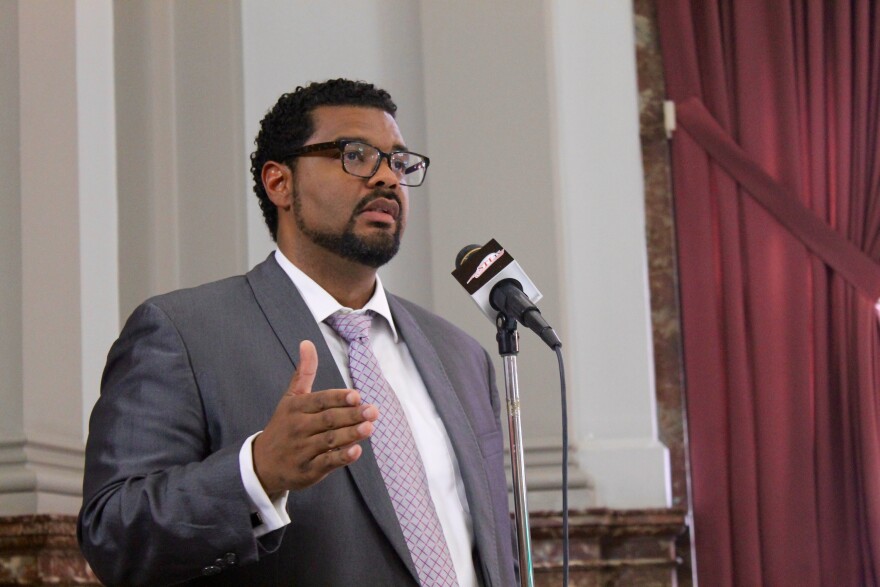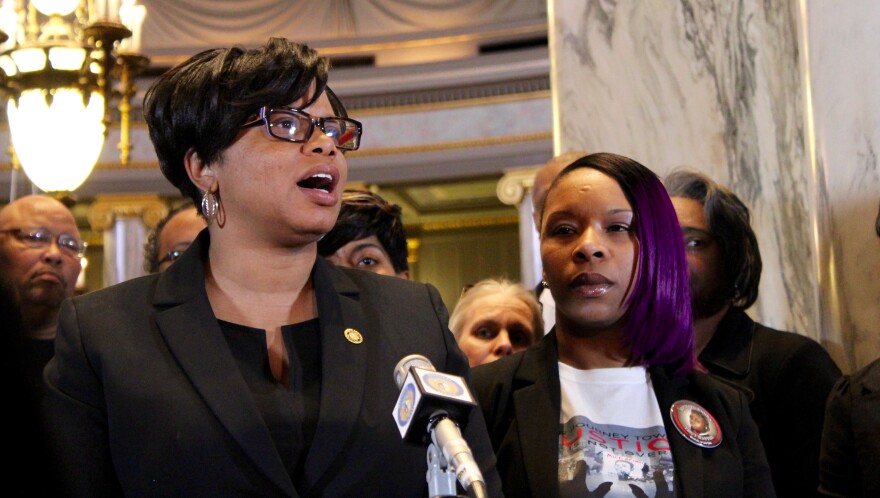It was just a couple of weeks ago that St. Louis Mayor Francis Slay unequivocally told this reporter that he would run for a historic fifth term.
Now, the Democratic official has changed course and won’t be running for another four years in office. And that means next year’s mayoral contest could be a free-for-all of epic proportions.
With Slay out of the picture, the city’s other political — and non-political — leaders have a chance to throw their proverbial hats in the ring. It’s not out of the question that a number of well-supported candidates could compete against each other, making for an unpredictable and suspenseful contest.
Since the city of St. Louis is heavily Democratic, it’s highly likely that the winner of next year’s Democratic primary will be the next mayor. It’s not out of the question, though, that legitimate candidates could run as independents, which would force folks to pay attention to the April general election.
Although list of potential Slay successors is hypothetically endless, here are a few names that come to mind:
St. Louis Collector of Revenue Gregory F.X. Daly

Running in an open race for mayor is going to be expensive — probably requiring a candidate to raise several million dollars. With more than $650,000 cash on hand, Daly would have a significant financial head start over competitors. He also has an established political presence in south St. Louis, which typically turns out in force during citywide elections.
Reached by phone on Friday, Daly told St. Louis Public Radio that he was seriously considering running for Slay's current job.
“I’m very much looking at this,” Daly said. “In the next couple of weeks, we’re going to have to take the temperature here and see how things shake out. But yes. I am very interested and very much going to be looking into the possibility of running for mayor of the city of St. Louis.”
Before becoming collector of revenue in 2007, Daly was the city’s license collector. He also served as an aide to several Board of Aldermen presidents, including Slay. He notes that he’s been working on political campaigns since the early 1980s — and that’s put him in touch with politically active people all across the city.
“When I show up at a neighborhood meeting or at a ward meeting or whatever the case may be, this won’t be my first time there,” Daly said. “So I think I am able to walk in, be recognized with some of these groups and be the kind of candidate that I have prepared myself to be. And I think I definitely step out in front of anybody at this stage of the game, just because of my previous involvement in the community.”
St. Louis Treasurer Tishaura Jones

Jones has developed an extensive political following since winning election to the city treasurer’s office, so much so that she was considered a serious contender to become the next state auditor. But when it came to running for mayor the former state representative had indicated elsewhere that it would be difficult for her to go against Slay, considering he had so much campaign money in the bank. (Jones has about $50,000 cash on hand.)
Still, Jones managed to win a competitive treasurer’s race in 2012 with less money than some of her Democratic competitors. She probably gained a lot of progressive-minded fans when she spoke out against a funding deal for a now-quashed riverfront stadium. And she may able to harness political support from supportive aldermen, state lawmakers and city officials to make a serious run.
In a statement, Jones said she is “focused on my re-election campaign for Treasurer, and am taking time to consider my options.” Since Jones isn’t facing serious competition for re-election, she could have a lot of time to think about her next move.
St. Louis Comptroller Darlene Green
Green has been a constant in city government even before she was appointed to powerful comptroller post in the 1990s. She’s proven adept at fending off competitive challenges for re-election, so much so that she won another term in office in 2013 without any significant opposition.

In fact, Alderwoman Marlene Davis indicated last year during the debate over a stadium funding proposalthat Green was one of the most popular elected officials in St. Louis – a status that, if accurate, could make her very credible mayoral candidate. She has about $200,000 cash on hand, a decent starting position.
If Green does decide to run for mayor, she would have to vacate her current post. Not only could that factor into Green’s decision, but it could spark a domino effect: It’s not out of the question, for instance, that a Green mayoral candidacy would spark Jones or other contenders to run for comptroller.
Alderman Lyda Krewson, D-28th Ward

Krewson represents a portion of St. Louis’ fast-growing central corridor. She’s gained a reputation on the Board of Aldermen for being a consensus-builder, including on thorny issues like a citywide smoking ban. And despite losing a citywide race (a bid for Board of Aldermen president against Jim Shrewsbury), she’s easily won re-election to the board since the 1990s.
Krewson has about $226,000 cash on hand, a decent start to run a serious campaign. And it’s not out of character for St. Louisans to elect central corridor-based politicians as mayor, since Vince Schoemehl won the post three times in a row.
St. Louis Board of Aldermen President Lewis Reed
Out of anybody on a potential “who will run for mayor list,” Reed is the only person (save for perennial candidate Jimmie Matthews) who has actually run for the post. While he lost to Slay by a fairly decisive margin, he did see his fortunes reverse in 2014 and the early part of 2015 when some of his political allies won contest city elections.

But Reed had a rough end to 2015 when he got into a very public spat with Alderman Megan Green over a stadium proposal. He had to issue an apology after appearing on a radio show where the host slung misogynistic insults toward Green.
Still, any person who’s won election citywide has to be taken seriously as a mayoral candidate. Reed has $144,000 in his campaign account, and that could be enough to be a credible candidate in a potentially large field.
He told St. Louis Public Radio that "absolutely I have interest" in the mayor's office, calling Slay's decision not to run again a great opportunity for the city.
Alderman Antonio French, D-21st Ward

After meticulously documenting St. Louis politics through PubDef.net, French won election to the Board of Aldermen and quickly emerged as a critic of the Slay administration. He also gained a significant national following after the unrest in Ferguson, sparking plenty of speculation about his next political move.
Since French is up for re-election next year, he would have to give up his aldermanic spot to run for mayor.
He also would have to do some serious fundraising, since he only has $855 in his campaign account.
Reed and French are close political allies, so it remains to be seen if both men would seek the mayor's post at the same time.
Sen. Jamilah Nasheed, D-St. Louis
Nasheed has established herself as an electoral warrior, beating back opposition for state representative in 2006 and 2008 and an incumbent state senator in 2012. She’s also proven adept at fundraising: She has about $300,000 cash on hand, some of which she’ll probably use in her re-election campaign against Democrat Dylan Hassinger.

When asked a half hour after Slay’s announcement if she’d think of running for mayor, Nasheed replied: “It’s just way too early to begin to talk about that right now.”
If Nasheed doesn’t take the plunge, St. Louis has a number of state lawmakers who could probably make credible mayoral bids. That includes term-limited legislators like House Minority Leader Jake Hummel, D-St. Louis, and state Rep. Mike Colona, D-St. Louis, as well as sitting lawmakers like state Sen. Joe Keaveny, D-St. Louis, state Reps. Karla May, D-St. Louis, and Michael Butler, D-St. Louis. Assuming the sitting state reps win election later this year, any state lawmaker could run for mayor and keep his or her seat in the Missouri General Assembly.
Whether she runs or not, Nasheed says candidates should make rebuilding north St. Louis a major priority.
“Right now, we have vacant and abandoned buildings that are crumbling,” Nasheed said. “We need to infuse approximately 10,000 residents north of Delmar so that we can begin to rebuild north St. Louis. North St. Louis is a part of the city, and for too long we have not been able to grasp how important it is to make it vibrant and develop that area.”
St. Louis Police Chief Sam Dotson

While not in elected office, Dotson’s job has constantly placed him in the public eye — and made him highly visible to ordinary St. Louisans. And it’s not out of the ordinary for a police chief to become mayor, as Clarence Harmon did in the 1990s.
But if Dotson does run for mayor, he could face criticism for how he’s managed the police department during a recent spike in crime — or handled high-profile police shootings. And running in a political campaign is a lot different from leading a governmental department.
Still, even though Dotson would be starting from scratch financially, he would have a decent start in terms of name recognition — which could matter a great deal in a crowded field.
Leah Freeman, a spokeswoman for the St. Louis Police Department, said in an e-mail that Chief Dotson "is enjoying serving as chief of police for the Metropolitan Police Department."
"Since 2006, crime in the city of St. Louis is down nearly 50 percent and Chief Dotson will continue to focus on crime reduction and ensuring our city is a safe place to live, work and visit," she said.
Attorney Jerry Schlichter

While Schlichter has not run for office before, he’s made a pretty big impact on the landscape St. Louis. He was instrumental in developing the Historic Preservation Tax Credit, which many point to as the catalyst for revitalizing Washington Avenue. He’s also been heavily involved with Arch Grants, a program aimed at cultivating entrepreneurship.
Even if Schlichter doesn’t run, it’s not out of the question that a prominent attorney or businessman takes the plunge. There’s precedent: Attorney Sly James won the mayorship of Kansas City in 2011 without any elected experience — and easily won re-election last year.
St. Louis School Board member Bill Haas

Fresh off of publishing a novel, the Ivy League-educated attorney is taking another shot at elected office with his Democratic bid for the 1st Congressional District. In addition to winning several terms on the St. Louis School Board, Haas has often performed fairly well in crowded primaries — such as his 2012 bid for lieutenant governor. (He’s also run for mayor, but obviously hasn’t won quite yet.)
Haas sent this reporter an e-mail today noting that he was about “to text my friend Lyda, ‘Madame Mayor.’ She will be Slay's designee and the odds on favorite to win.” (Haas is presumably talking about Krewson. She defeated Haas by a landslide in last year’s aldermanic primary for the 28th Ward.)
“But it's going to be crowded, including probably me,” Haas said. “Not a perennial candidate, [because] I've won five out of 19 elections, but perennial for mayor. Like most of my elections except school board, I'd need a lottery win, and even that didn’t help in 1993.”
On the Trail, a weekly column, weaves together some of the intriguing threads from the world of Missouri politics.




